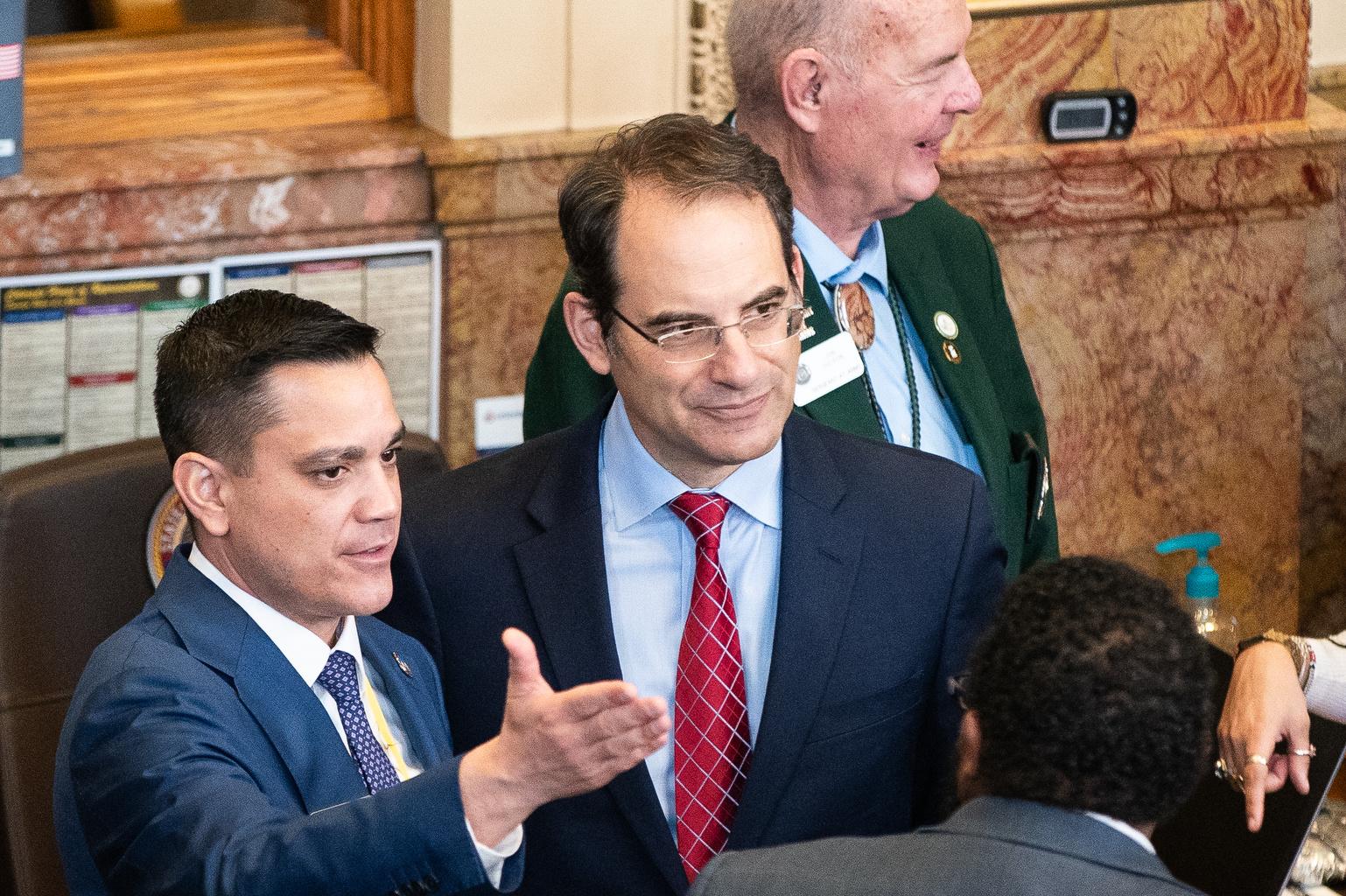Updated at 11:25 a.m. on Friday, Aug. 8, 2025.
A Colorado statute that limits what local law enforcement can share with immigration officials is unconstitutional and is being used to target a Mesa County sheriff’s deputy, the county alleged in a lawsuit filed against top state officials Thursday.
The lawsuit, filed in federal court, is the latest step in a dispute between county, state and federal officials wherein a 19-year-old college student was detained at an immigration facility in Aurora for 15 days. The arrest by federal immigration officials was preceded by a traffic stop June 5 conducted by a Mesa County sheriff’s deputy. The deputy, Alexander Zwinck, let the woman, Caroline Dias Goncalves, leave with a warning but not before alerting immigration officials via a Signal group chat purportedly meant for drug interdiction cases.
Attorney General Phil Weiser said those actions violated state statute, prompting a lawsuit against Zwinck. Zwinck was placed on three weeks unpaid leave by Mesa County Sheriff Todd Rowell, who also issued a stern rebuke in a public statement criticizing the attorney general’s handling of the investigation. This week Mesa County took it a step forward by taking the attorney general to court.
“This action sends a clear message: We will not stand by while our employees are targeted for doing their jobs. This step is not just lawful, it's necessary, it protects those who protect our community and ensures they can continue to work without fear of politically motivated litigation,” Mesa County Attorney Todd Starr said during a county commissioner meeting, Tuesday.
The Colorado Attorney General’s office issued this statement in response to the pending litigation: “Colorado law is clear that law enforcement does law enforcement and not federal civil immigration enforcement. It’s unfortunate that Mesa County filed this lawsuit. The Department of Law has a responsibility to follow facts and defend and enforce state law. We’ll continue to take this duty seriously.”
The 31-page filing takes issue with the law, known as Article 74, in a few ways, including that it is too vague and confusing for law enforcement.
“As a direct and immediate consequence of Article 74’s lack of clarity coupled with the severe penalties for noncompliance with its provisions and the potential for career and reputational damage, the MCSO and Plaintiffs have been forced to pull back from cooperating with federal law enforcement agencies and have suffered, and will suffer, a corresponding loss of grant funding,” the lawsuit alleges.
The suit points to several scenarios in which information that may be prohibited from being shared would be necessary for non-immigration law enforcement actions. Those include sharing data for drug trafficking investigations and internet crimes against children cases. As a part of the case, the county asked that a federal judge issue clarification that a violation of the law only occurs if a law enforcement officer shares information “for the sole purpose” of assisting in federal immigration enforcement.
In the court filing, the county alleges that Zwinck’s sharing of data with immigration officials was necessary for drug enforcement operations and not specifically immigration related. Messages from the group chat released earlier by the attorney general’s office include a conversation from the day after the Dias Goncalves stop wherein a federal agent told Zwinck he “is gonna get ERO interdictor of the year.” ERO stands for enforcement and removal operations, which regards removing individuals who violate immigration laws from the country.
Mesa County’s lawsuit makes numerous references to the potential harms that employees of the Mesa County Sheriff’s Office face, including reputational and career fallout as well as potential civil fines of up to $50,000. It also notes that further investigation of statutory violations by law enforcement could be detrimental.
“Attorney General Weiser has stated that his office is also investigating broader alleged misconduct involving the Signal chat group to determine if they engaged in a “pattern or practice” of conduct that violates state laws. This conduct places the individual Plaintiffs at risk for penalties and additional harm to their livelihood and reputations,” the lawsuit reads.
In addition to noting the vagueness of the law — which the county says is in violation of the 14th Amendment — the county argues the state law runs counter to the supremacy clause because the federal government has discretion over naturalization. This is also a key tenet of an ongoing lawsuit filed by the federal government against Colorado over so-called ‘sanctuary laws.’
“Plaintiffs concur with the United States that Article 74 impermissibly bars political subdivision employees from complying with the foregoing federal law,” the county argues.
Earlier this week, Mesa County Commissioners unanimously approved the lawsuit as well as public funds to handle the legal fees. This includes public funds to handle fees associated with defending Zwinck from the state’s lawsuit. Commissioner Cody Davis said Tuesday the state’s actions amounted to “political theater at the expense of a single officer.”
“The reason we're filing this federal lawsuit today (is) not to fan the flames, but to get clarity, to get constitutional clarity because the law as written is vague. It's conflicting. And, if left unchallenged, it puts every officer in Colorado at risk of being punished for doing what they've been trained to do, to work with, share information with fellow law enforcement,” Davis said.
The Mesa County Sheriff’s Office ultimately disciplined five employees for their actions in relation to the traffic stop, with Zwinck receiving the longest stretch of unpaid leave.
Editor's Note: This article has been updated to include a response from the Colorado Attorney General's office.
- Suit against deputy involved in ICE traffic stop sends ‘demoralizing message,’ says sheriff
- Colorado’s Attorney General wants to know if Western Slope law enforcement agencies are working with ICE
- University of Utah student released, speaks out after being picked up by ICE in Mesa County
- Mesa County immigration stop prompts investigation at sheriff’s office









